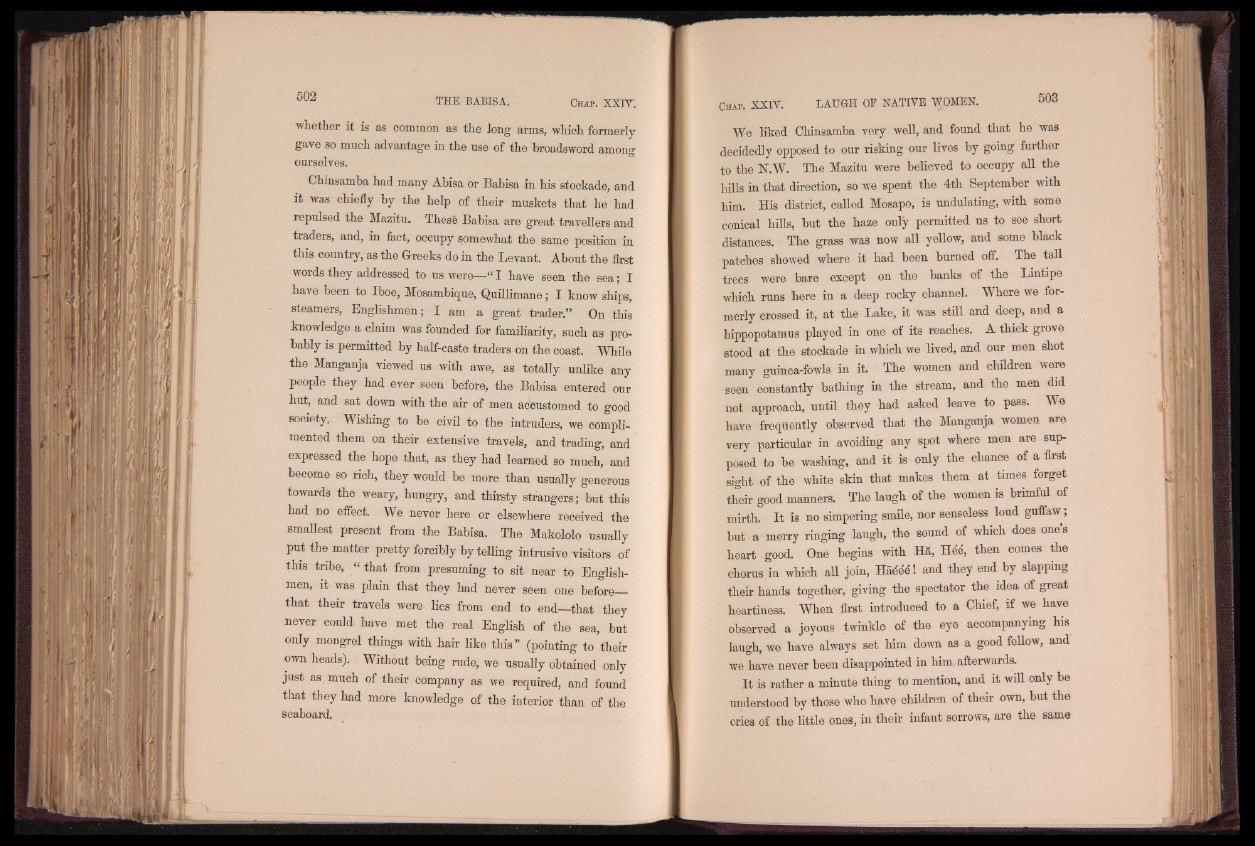
whether it is as common as the long arms, which formerly
gave so much advantage in the use of the broadsword among
ourselves.
Chinsamba had many Abisa or Babisa in his stockade, and
it was chiefly by the help of their muskets that he had
repulsed the Mazitu. These Babisa are great travellers and
traders, and, in fact, occupy somewhat the same position in
this country, as the Greeks do in the Levant. About the first
words they addressed to us were—“ I have seen the sea; I
have been to Iboe, Mosambique, Quillimane; I know ships,
steamers, Englishmen; I am a great trader.” On this
knowledge a claim was founded for familiarity, such as probably
is permitted by half-caste traders on the coast. While
the Manganja viewed us with awe, as totally unlike any
people they had ever seen before, the Babisa entered our
hut, and sat down with the air of men accustomed to good
society. Wishing to be civil to the intruders, we complimented
them on their extensive travels, and trading, and
expressed the hope that, as they had learned so much, and
become so rich, they would be more than usually generous
towards the weary, hungry, and thirsty strangers; but this
had no effect. We never here or elsewhere received the
smallest present from the Babisa. The Makololo usually
put the matter pretty forcibly by telling intrusive visitors of
this tribe, “ that from presuming to sit near to English.
men, it was plain that they had never seen one before__
that their travels were lies from end to end—that they
never could have met the real English of the sea, but
only mongrel things with hair like this” (pointing to their
own heads). Without being rude, we usually obtained only
just as much of their company as we required, and found
that they had more knowledge of the interior than of the
seaboard.
We liked Chinsamba very well, and found that he was
decidedly opposed to our risking our lives by going further
to the N.W. The Mazitu were believed to occupy all the
Bills in that direction, so we spent the 4th September with
him. His district, called Mosapo, is undulating, with some
conical hills, but the haze only permitted us to see short
distances. The grass was now all yellow, and some black
patches showed where it had been burned off. The tall
trees were bare except on the banks of the Lintipe
which runs here in a deep rocky channel. Where we formerly
crossed it, at the Lake, it was still and deep, and a
hippopotamus played in one of its reaches. A thick grove
stood at the stockade in which we lived, and our men shot
many guinea-fowls in it. The women and children were
seen constantly bathing in the stream, and the men did
not approach, until they had asked leave to pass. We
have frequently observed that the Manganja women are
very particular in avoiding any spot where men are supposed
to be washing, and it is only the chance of a first
sight of the white skin that makes them at times forget
their good manners. The laugh of the women is brimM of
mirth. I t is no simpering smile, nor senseless loud guffaw;
but a merry ringing laugh, the sound of which does one’s
heart good. One begins with Hit, Hee, then comes the
chorus in which all join, Haded! and they end by slapping
their hands together, giving the spectator the idea of great
heartiness. When first introduced to a Chief, if we have
observed a joyous twinkle of the eye accompanying his
laugh, we have always set him down as a good fellow, and
we have never been disappointed in him, afterwards.
I t is rather a minute thing to mention, and it will only be
understood by those who have children of their own, but the
cries of the little ones, in their infant sorrows, are the same